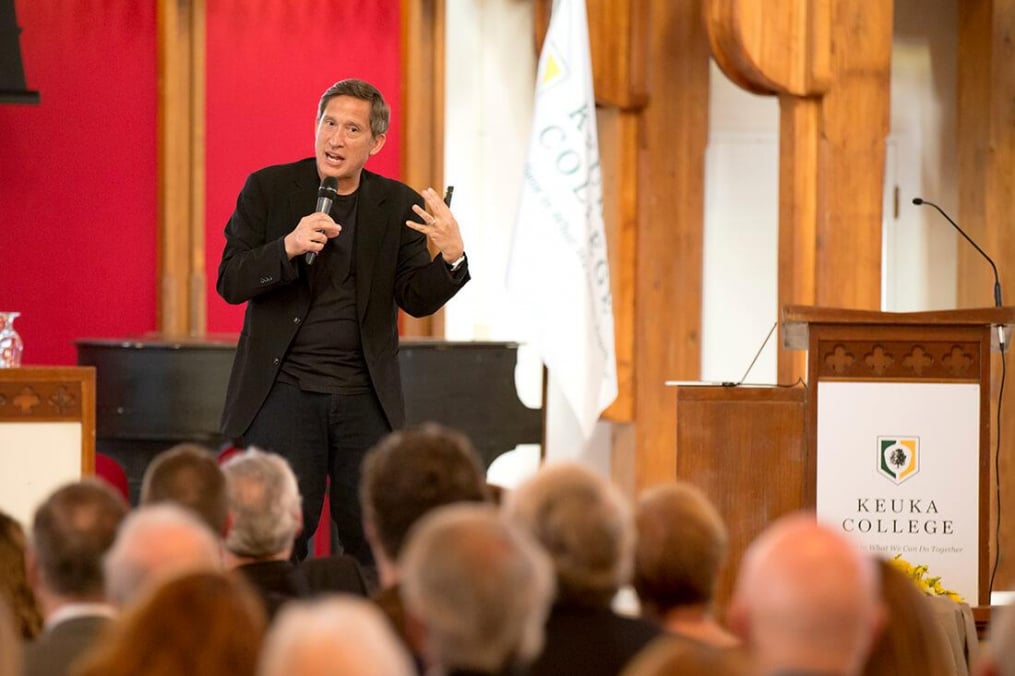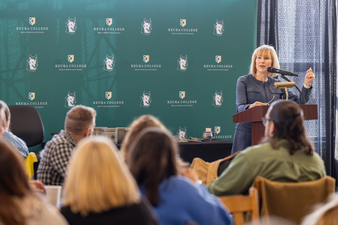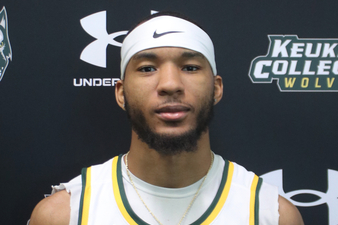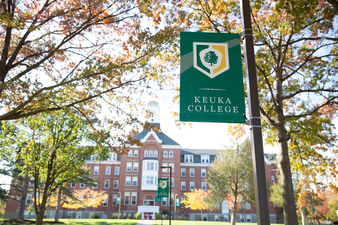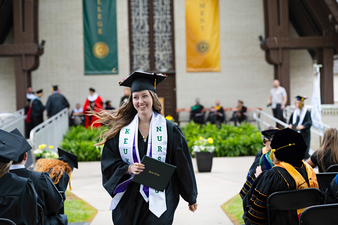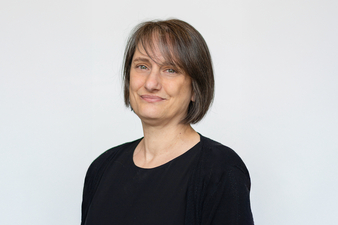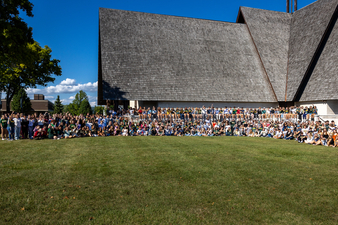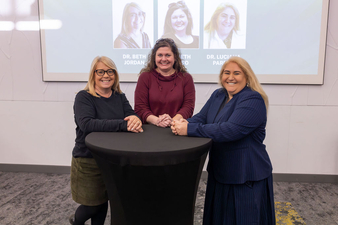During the 28th Annual Carl and Fanny Fribolin Lecture, Dr. José Antonio Bowen, president of Goucher College, challenged the crowd in Norton Chapel to change the way they think about technology in the college classroom and its uses.
One way Dr. Bowen has rethought his classroom is by thinking about how technology and liberal arts can combine in the new learning economy—what he calls “teaching naked,” a new way to think about higher education, learning, and technology that prioritizes the benefits of the human dimension.
“Technology is profoundly changing education, and if students are going to continue to attend classes on campus rather than online, colleges will need to maximize ‘naked’ face-to-face contact with faculty,” Dr. Bowen said. “Humanity and relationships matter, and small liberal arts colleges bring people together. Because when asked what really matters to students, they always say it’s the people. Professor X, my coach, or the conversations with my friends.”
So thinking about how college courses are designed and the way technology is integrated is important, adds Dr. Bowen.
“The ‘naked’ classroom is not neat row upon neat row of seats facing forward,” said Dr. Bowen. “It’s a little messy, but much more active learning is happening. It’s not that we need more technology in the classroom, because more doesn’t mean better. We need to use technology in ways that help us change the way we think, such as when playing a video game.”
According to Dr. Bowen, games are a great teacher because the way you sell a game is by keeping the player engaged, what he says is being ‘pleasantly frustrated.’
“Being pleasantly frustrated means a task is just difficult enough to be fun without being overwhelming. And you need to be pleasantly frustrated in everything you do, whether you take classes in yoga or psychology,” he said. “And by the time students enroll in college, they have logged more than 10,000 hours of gaming time—more hours than they were in school. So how do we make a classroom more like a game?”
Dr. Bowen shared a story about one professor, who, rather than calling a midterm or final a ‘test,’ refers to them as quests. Because in a video game, the player conquers the quest to earn points and continue on.
Dr. Bowen also outlined that when used effectively, technology can ensure that students arrive to class more prepared for meaningful interaction with faculty. For example, he uses Twitter to reinforce what is being taught in the classroom.
“I ask the class to find something in the world that relates or connects back to the material we are covering in class, and tweet it back to us,” said Dr. Bowen. “It keeps the brain thinking and engaged.”
Dr. Bowen also suggested that instead of making announcements in class, faculty post them to a group Facebook page, or send an email, tweet, or text. He also suggested that faculty spend some time online via a social media site, where students can ask questions and everyone can see the answer. And when the time is up, the best part Dr. Bowen says, is that the students are still talking to each other about the material.
“I also use these platforms to give gentle reminders and encouragement to my students,” he said. “And not just Sunday night before I go to bed; sometimes it’s a Tuesday at 3 p.m., when students need that reminder. Just a short note can be meaningful, as well as a motivator.”
“This also builds a community, which enhances learning,” he said. “I also make sure to remind students to take time for reflection and final thoughts. I have them read a chapter, close the book, and tell their roommate what they just read, or write it on an index card. This helps retain the material for longer. Resting the brain is just as important as keeping the brain active. It allows you to pause and reflect on what you’ve learned, which makes it easier to remember things longer.”
Because of technology, our relationship to knowledge has changed, and we don’t need to memorize facts like we used to, Dr. Bowen adds.
“For example, we used to look up information in an encyclopedia. And that was accurate, but not always up to date,” he said. “Now, we have access to an unbelievable amount of information right in our pockets, and it’s updated instantly. Knowledge is rich and plentiful, and the Internet has a lot of information, but where is the depth? It’s true that Siri knows information, but we need our human brains to think critically, analyze, and decipher what is real, what is a joke, and what may seem like news is really just user-generated content.”
Added Dr. Bowen: “Technology is a tool, not a strategy. When it comes down to it, employers still want the problem solving skills, the ability to work with others, critical thinking skills, and creativity. Both technology and learning are fundamentally about change, and liberal arts are the way to the future. We need to light fires to change minds, because when you change your mind, you learn new things.”

